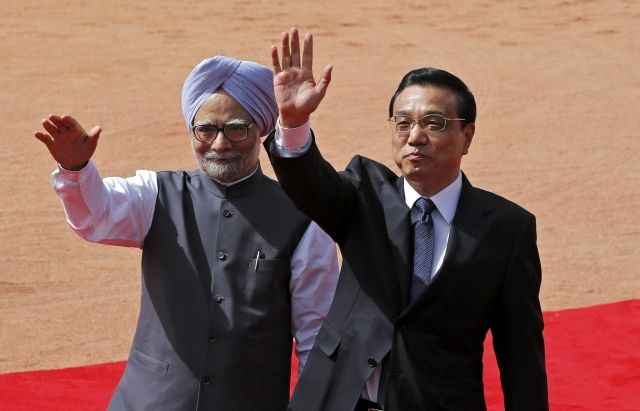Chinese Premier Li Keqiang’s India Visit: Indian Media Smitten By His Charm; Chinese Media Positive On Sino-Indian Ties

A mood of benign optimism, mostly devoid of nationalist sentiment, has taken over from the hostility and anxiety preceding Chinese Premier Li Keqiang’s maiden visit to India.
The belligerence, which had built up over the weeks before the visit was triggered by mounting tensions between New Delhi and Beijing, after India accused Chinese troops of an incursion into Indian territory in Jammu and Kashmir on the night of April 15, has since died down.
“As the dispute enters its third week, alarm in the Indian capital is growing,” the New York Times had stated on May 2.
And, a measured response from India’s ruling Congress party, to Chinese soldiers setting up a camp six miles over the border in the Himalayas, was categorically criticized by opposition parties, some allies, and a section of the media.
Mulayam Singh Yadav, chief of the Samajwadi party, which is a key ally in the Congress-led coalition government, went a step ahead and called China the “biggest enemy” of India.
Following the two rounds of talks between Premier Li and Prime Minister Manmohan Singh over the past three days, the commentary has turned optimistic about the future of the relationship between the two Asian giants.
“The Sino-Indian relationship is at its best period in decades despite mutual suspicion,” said an editorial published on Monday by China’s Global Times, which is owned by People's Daily, the Chinese Communist Party mouthpiece,
The Global Times termed the situation along the India-China border as “much better” than Beijing’s disputes with its other Asian neighbors including Japan and the Philippines, in the East and South China seas. It added that the “rationality” exercised by both the Indian and Chinese sides was “commendable in present-day Asia where nationalism runs rampant.”
China’s state-run news agency Xinhua, in a commentary published on Sunday, observed that the West tends to see China-India ties “through a prism of territorial disputes and inter-power rivalry.”
“The China-India relationship is more about the future than about the past,” the commentary said, adding that both sides “want fewer hostilities and confrontations in their neighborhood and, with their primary focus on national development.”
Indian media echoed the positive rhetoric in the Chinese media, with reports on the premier’s visit ranging from bilateral trade to Li’s personal style.
The Hindu, carried a column with high praise for Indian culture by Premier Li, titled “Handshake across the Himalayas.” And, in an editorial published on Tuesday, the newspaper observed that China’s new leadership appeared concerned about the fallout of the recent border skirmish and is “keen to allay Indian fears of its intentions.”
“Perhaps as evidence of its sincerity, the Chinese side has made its strongest commitment yet towards addressing the trade imbalance with India,” the editorial said.
“The continuing absence of boilerplate language about Tibet being an integral part of China — something the Chinese usually insist on in joint statements with India and others — is a reminder of the many layers to this complex relationship,” it added.
However, it noted that there was “still not enough clarity” about the Chinese position on Kashmir and the Ladakh incursion incident.
The Hindustan Times, in an editorial published on Monday, lauded Li for “stressing the importance of a mutually strategic partnership in his public statements” and “for facilitating eight new agreements to be signed between the two countries.”
“Li does seem to have walked his talk of greater harmony between the two countries,” it said.
The Times of India noted that the new leaders in Beijing -- President Xi Jinping and Premier Li -- joined politics after the 1962 war between India and China, and that they may not be “burdened by the baggage of a bellicose history.”
The commentary said India should seize the opportunity by going beyond “any border cooperation agreement the Chinese may be seeking, by offering to resolve the border issue permanently.”
On the other hand, a report based on a public survey released on Monday, by the Lowy Institute for International Policy, an Australian think tank, showed “wariness towards China from the Indian public.”
The survey, based on a representative sample of 1,233 people, found that while 63 percent of the Indian people would like relations with China to strengthen, as much as 83 percent of the Indian public considered China to be a security threat. In response to China’s rise as a global power, while 64 percent said India should cooperate with China to play a leading role in the world, 65 percent of respondents said India should join other countries to limit China’s influence.
“The poll reveals multiple reasons for this mistrust, including China’s possession of nuclear weapons, competition for resources in third countries, China’s efforts to strengthen its relations with other countries in the Indian Ocean region, and the China-India border dispute,” the report stated.
© Copyright IBTimes 2024. All rights reserved.






















